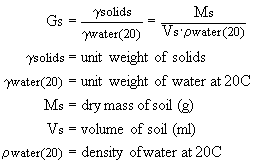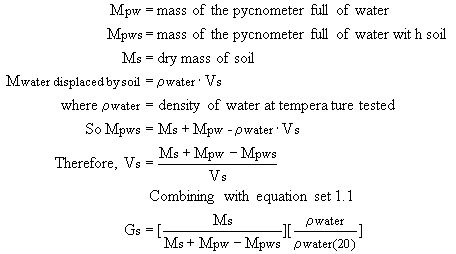Specific Gravity
General
|
The ratio of the unit weight of a material to the unit
weight of distilled water at 4°C is a common definition of specific
gravity. Soil specific gravities, however, are normally referred to the
weight of water at 20°C. In itself, the specific gravity is not an
index property of a soil. It is, however, required for determination of
the unit weight of a soil and in many computations.
While it is possible to have a range of values from 2.2 to 3.5, most soils have specific gravity from 2.60 to 2.80. Any values outside of this latter range should be viewed skeptically and a re-test should be made to verify the value. Where specific values are not available, the following can be assumed for local soils: Sand and gravels: 2.65 By definition the equation for specific gravity is: Equation Set 1.1
The specific gravity test uses a flask of known volume (500 ml typically) called a pycnometer. Based on the measured masses Mpw, Mpws and Ms, specific gravity can be calculated as below. Remember to be consistent with units (typically grams and milliliters). Pycnometer masses listed are without the mass of the flask itself. Equation Set 1.2
However, the variation of the density of water with temperature must be accounted for between measuring pycnometer mass full of water and full of water and soil. In addition, the volume of the pycnometer itself changes with temperature. Two methods are commonly used to compensate:
|
Apparatus
|
|
Procedure
|
|
References
|
|







